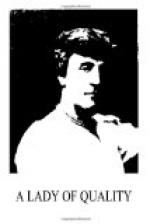It is, indeed, strangely easy in the great world for a man to lose his importance, and from having been the target for all eyes and the subject of all conversation, to step from his place, or find it so taken by some rival that it would seem, judging from the general obliviousness to him, that he had never existed. But few years before no fashionable gathering would have been felt complete had it not been graced by the presence of the young and fascinating Lovelace, Sir John Oxon. Women favoured him, and men made themselves his boon companions; his wit was repeated; the fashion of his hair and the cut of his waistcoat copied. He was at first rich and gay enough to be courted and made a favourite; but when his fortune was squandered, and his marriage with the heiress came to naught, those qualities which were vicious and base in him were more easy to be seen. Besides, there came new male beauties and new dandies with greater resources and more of prudence, and these, beginning to set fashion, win ladies’ hearts, and make conquests, so drew the attention of the public mind that he was less noticeable, being only one of many, instead of ruling singly as it had seemed that by some strange chance he did at first. There were indeed so many stories told of his light ways, that their novelty being worn off and new ones still repeated, such persons as concerned themselves with matters of reputation either through conscience or policy, began to speak of him with less of warmth or leniency.
“’Tis not well for a matron with daughters to marry and with sons to keep an eye to,” it was said, “to have in her household too often a young gentleman who has squandered his fortune in dice and drink and wild living, and who ’twas known was cast off by a reputable young lady of fortune.”
So there were fine ladies who began to avoid him, and those in power at Court and in the world who regarded him with lessening favour day by day! In truth, he had such debts, and his creditors pressed him so ceaselessly, that even had the world’s favour continued, his life must have changed its aspect greatly. His lodgings were no longer the most luxurious in the fashionable part of the town, his brocades and laces were no longer of the richest, nor his habit of the very latest and most modish cut; he had no more an equipage attracting every eye as he drove forth, nor a gentleman’s gentleman whose swagger and pomp outdid that of all others in his world. Soon after the breaking of his marriage with the heiress, his mother had died, and his relatives being few, and those of an order strictly averse to the habits of ill-provided and extravagant kinsmen, he had but few family ties. Other ties he had, ’twas true, but they were not such as were accounted legal or worthy of attention either by himself or those related to him.
So it befell that when my Lady Dunstanwolde’s lacquey could not find him at his lodgings, and as the days went past neither his landlady nor his creditors beheld him again, his absence from the scene was not considered unaccountable by them, nor did it attract the notice it would have done in times gone by.




